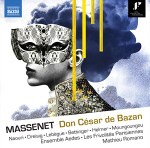|
Back
06/23/2020
Jules Massenet: Don César de Bazan (1888 version)
Laurent Naouri (Don César de Bazan), Elsa Dreisig (Maritana), Marion Lebègue (Lazarille), Thomas Bettinger (King Charles II of Spain), Christian Helmer (Don José de Santarém), Christian Moungoungou (Captain of the Guard), Ensemble Aedes, Orchestre des Frivolités, Mathieu Romano (conductor)
Recording: Théâtre Impérial de Compiègne, France (February 13-17, 2019) – 112’05
Naxos 8.660464-65 – Booklet in English and French

   
Significant to the background of this CD, Don César de Bazan was Jules Massenet’s first full-length opera. Naxos’ release turns to the 1888 version, after an 1872 grand opening [on November 30, 1872 and a mere 13 performances] found the Salle Favart 2 (now known as the Théâtre nacional de l'Opéra-Comique) destroyed by fire in 1887, including Massenet’s fully-orchestrated score. That prompted the composer to create a new version via his own vocal score, fortunately having been preserved by Hartmann publishing.
In 1845 Irishman William Vincent Wallace based his Maritana upon Victor Hugo’s 1838 Ruy Blas replete with Gaelic benevolence. While more balladic in nature, Massenet’s version jumps forth with greater Gallic friction and heft. Don César de Bazan is a captivating potpourri of dramatic arches, mysticism, Italianate spouts, a ravishing duet, lilting arias and a crescendo quartet (ref: “The Lost Quartet”). Completed in only a matter of several weeks, there’s remarkable sophistication, maturity and brevity for a man of such a young age. But the inherent charm inside the music is its dappled touches of several French Romantic operas including Massenet’s own futuristic footprints.
The opening “Ballade aragonaise” immediately signals to Le Cid and Don Quichotte. This canzone, a riddled, fractioned version of the coloratura vocal gem, “Sevillana”, reveals Elsa Dreisig chirping away like a nightingale, replete with wondrous, catchy grace notes and a witty edge. Her compartment is pure enchantment.
Frequenting The Met with a firmly established career, Laurent Naouri’s baritone register brings the perfect amount of arrogance and swagger to the title role. There’s a keen bracket of jaggy quality inside his Act II couplets that search back to Baskir’s “De près ou de loin” from David’s Lalla Roukh. When adding Christian Helmer’s Don José, in the "temptation discussion" ("Me marier!"), the humorous combination couldn’t be better. This repartee, rife of Rossini, filling the air with ‘patters’ and piles of nasal buffo (ref: Il barbieri’s ‘Don Alonso’), trend the passage with hilarity.
Though Thomas Bettinger appears to get off to a shaky start in Act I, his King Charles II of Spain "gets wind in his sails", allowing time to savor the silliness during the mistaken identity conundrum of Act III’s “Qui je suis?” This strikes closely at Meyerbeer’s Hoël/Corentin “Treasure Duet” ("Quand l'heure sonnera") from Dinorah. Their singing is sharply executed!
As if paying tribute to Charles Gounod and the Roméo et Juliette trouser-role, Stéphano, or even Verdi's Oscar, Marion Lebègue’s Lazarille is one trusted voice, formative and a keeper of tomboyish affirmation, sized up with well-articulated projection and superior control. Act IV’s “Duo Nocturne”, “Aux cœurs les plus troublés”, along with Mlle Dreisig, brings with it a bittersweet though elegant dialect, harkening back to Chabrier’s Minka/Alexina discourse inside Le Roi malgré lui [the opera, ironically, premiering only seven days prior to the Salle Favart 2 fire!]…a pristine, shiny adventure. Gorgeous!
The Don César/Maritana duet (“Je m’en souviene”) has a milder scaled climactic and pivotal edge, but none the less-effective than that of Massenet’s forthcoming Le Mage, yet the emotional strength forcefully points more definitively to the rushing magnetism from Act III’s Manon. Stupendous and mighty.
The Orchestre des Frivolités Parisiennes' sharply-attuned responses, under a rapidly fluctuating, multi-textured score, is a rarity. [Disappointingly, Mathieu Romano's "Entr'acte Sevillana" is "instructional" and lethargic]. The Ensemble Aedes' vocal outreaches contain some of the loveliest musical folds. Anticipating his upcoming marriage (and eventual "execution"), M. Naouri leads a chivalric "Chanson de Matalobos" that carries a spirited charge reminiscent to Thomas' Hamlet or even spots of Gounod's Cinq-Mars.
Though Don César de Bazan’s music doesn’t live up to the grand stature of Manon or Werther, it clearly shows Jules Massenet’s early symphonic fluidity and an apogee of theatrics. He was the master! Naxos’ recording is important, for this lays the building blocks for Jules Massenet’s works to come. Any passionate fan will find the music fascinating, persuasive and, plainly said, “a keeper”. Revelatory.
Christie Grimstad
|